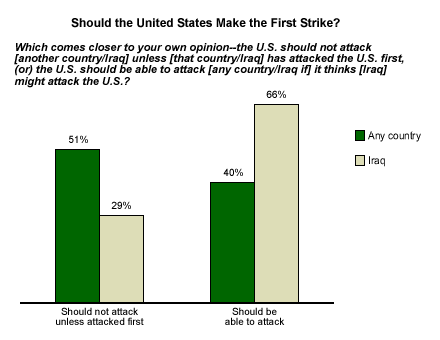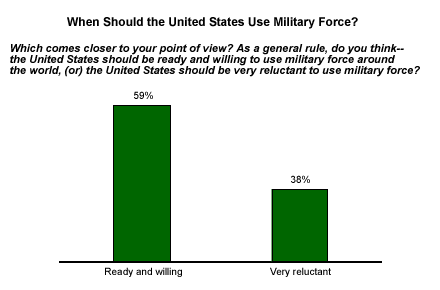The U.S. war on terror and the current standoff with Iraq have pundits and politicians frequently addressing the question of when the U.S. military is justified in attacking another country that has not taken any military action against the United States. Is it acceptable for the United States to strike another country first, or should the world's only remaining superpower wait for sufficient military provocation from a hostile country before using military force?
As far as the American people are concerned, the answers are not simple. A recent CNN/USA Today/Gallup poll* shows that Americans are somewhat reluctant to conduct a military first strike, but many are willing to make an exception with regard to Iraq. And despite their general reluctance to strike first, Americans feel the country should be "ready and willing" to use military force around the world at any time.
Public More Supportive of "First Strike" Against Iraq Than Against "Any Country"
An Oct. 3-6 poll asked Americans two versions of a question about the use of U.S. military force to attack a country that has not attacked the United States. The first question asked half the respondents about "any country," while the second question asked the other half specifically about "Iraq."
A slight majority of Americans, 51%, say the United States should not attack another country unless that country has attacked first, while 40% believe the United States would be justified in striking another country first.
With regard to Iraq, however, two-thirds of Americans say the United States would be justified in mounting a first strike.

There are substantial gender and partisan differences on these two questions:
- Men are much more likely than women, by a 50% to 33% margin, to support the general notion of a first strike by the United States. But a majority of both men and women (69% and 62%, respectively) support first use of military force against Iraq -- an increase of 19 percentage points over the general case among men, 29 percentage points among women.
- Fifty-four percent of Republicans say that in general they would support a first strike by the United States, compared with 34% of independents and 35% of Democrats. Eight in 10 Republicans, meanwhile, say the United States should be able to launch a first strike against attack, while only 56% of Democrats and 61% of independents feel this way. The elevation of support for a first strike against Iraq over the more general question of a military first strike is similar among the three partisan groups.
U.S. Military Should Be "Ready and Willing"
Americans may be cautious about openly endorsing the first-strike notion, but 59% of respondents say the United States, as a general rule, should be ready and willing to use military force around the world. Fewer than 4 in 10 respondents (38%) say the United States should be "very reluctant" to use military force.

There is a 16-percentage point difference between Republicans and Democrats on this question. Nearly 7 in 10 Republicans (69%) feel the country should be ready and willing to use military force around the world, compared with 57% of independents and 53% of Democrats.
Key Points
While most Americans believe the U.S. military should be ready to use force around the world, they are somewhat reluctant to say the military should actually do so unless attacked. Although recent polling shows that most Americans would prefer the United States get support from the United Nations before it launches military action against Iraq, the October 2002 poll indicates that the public would be much more likely to condone a first strike against Iraq than they would be to more generally condone an attack against "any country."
*Results are based on telephone interviews with a randomly selected national sample of 1,502 adults, aged 18 and older, conducted Oct. 3-6, 2002. For results based on this sample, one can say with 95% confidence that the maximum error attributable to sampling and other random effects is ±3%. In addition to sampling error, question wording and practical difficulties in conducting surveys can introduce error or bias into the findings of public opinion polls.
